Đorđe Balašević, Famed Singer-Songwriter Dies Aged 67
February 19, 2021 - The entire region of former Yugoslavia was shaken today by the news that one of the biggest stars, singer-songwriter Đorđe Balašević, has passed away in Novi Sad, in Vojvodina in Serbia today.
Đorđe Balašević was born in 1953 in Novi Sad, and his solo career as a singer-songwriter started in 1982. He released 12 albums, and his concerts were among the biggest events for his fans throughout his career. During the wars in former Yugoslavia in the nineties, he was strongly on the side of peace, against nationalism, fighting and killing. He was not allowed to perform in Croatia for years (his last concert before the war in Zagreb was in 1989, and he was quite attached to Zagreb as he spent some time living there), and his anti-war and anti-nationalism stance made him very unpopular with the political establishment during Milošević's in Serbia as well. So, during the early nineties, it was almost impossible to hear any of his timeless hits on any radio stations in former Yugoslavia. 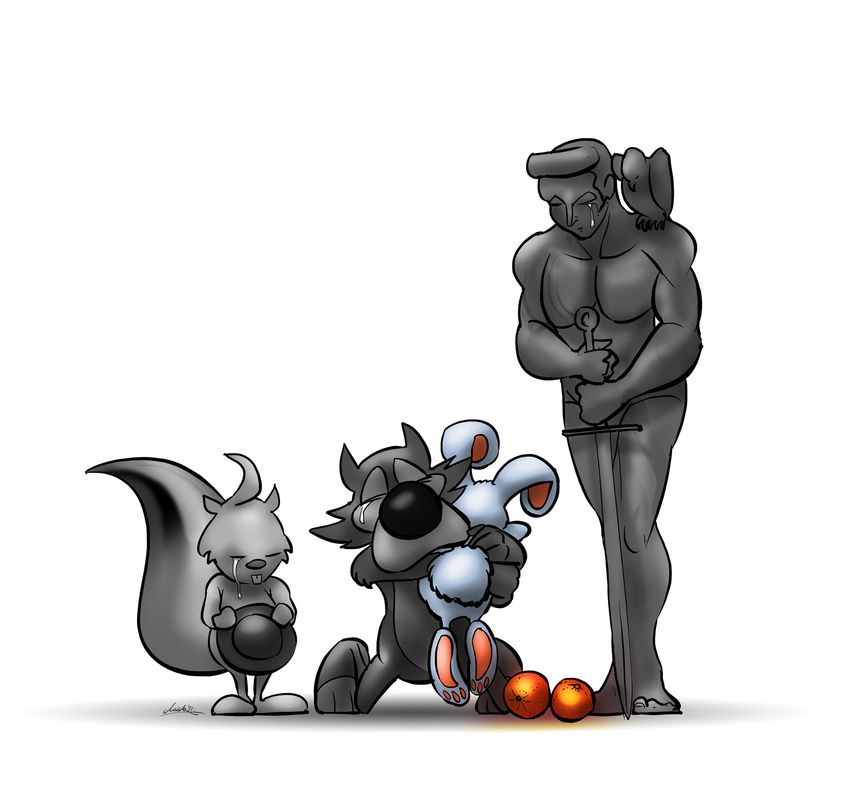
Famous Sarajevo cartoonist Midhat Kapetanovic posted to Facebook this touching work in memoriam following news of the beloved singer's death. The image shows Zagi the squirrel, mascot of Zagreb (from the 1987 Universiade), Vučko the wolf, mascot of Sarajevo (from the 1984 Winter Olympics) and the Mestrovic statue Pobednik (The Victor), the eternal symbol of Belgrade, united in grief. Vučko can be seen comforting a white bunny and there are two mandarins at their feet. It became a tradition for mandarins and toys – particularly white toy rabbits – to be affectionately thrown onto the stage by audience members when Đorđe Balašević performed the song ‘Neki novi klinci' © Midhat Kapetanovic
After the war, he has performed all over Croatia again, sharing with his devoted audience both his older hits and the newer songs which he wrote during the period when he was not performing. His concerts have always been quite long, sometimes lasting for more than four hours, and in addition to the music itself, included elements of stand-up comedy by Balašević himself. In 1998, the Washington Post compared Balašević to Bob Dylan in their story about his concerts in war-devastated Bosnia.
It's almost impossible to summarize his opus into one post, and to single out some of his best songs and performances for an international audience. If you ask almost any person from former Yugoslavia, they will have a story about Balašević, having been to one (or many) of his concerts, having sung some of his songs at various parties of their youth, having loved and lost with his music as a background. They will have so many different answers to the question of which is their favorite Balašević song, if they're at all able to single one out. So, below you can find one fan's selection of his greatest songs:
Most fans are probably not able to listen to Slovenska today, as it talks about what he wanted to happen to him if he passed away young.
Spontaneous mourning on the streets of Zagreb after news of the singer's death broke, as published by Croatian portal Index
Samoborska Cesnofka Becomes Protected Product After Kremsnita and Greblica
February 19, 2021 – In a relatively short period, more good news came from Samobor, both for the citizens of this tradition-rich town and its surroundings and for all local cuisine lovers. Namely, after the Rudarska greblica and samoborska kremsnita, samoborska cesnofka also became a protected product. Enough reason to visit this charming medieval town in Zagreb County this weekend?
Samoborska češnofka, a favorite Samobor garlic sausage, received national protection of geographical origin from the Ministry of Agriculture. This transitional protection at the national level is an essential first step towards gaining the status it deserves on the European gastronomic map.
Tradition of more than a hundred years
When the European Commission decides to protect it on the EU level, samoborska cesnofka will be protected from unauthorized use and misuse throughout the European Union market, just like Rudarska greblica now, a local specialty from Samobor area. However, Samoborska kremšnita entered the Croatian Register of Protected Cultural Heritage.
Samoborska češnofka, named after its main ingredient – a decoction of garlic (in Croatian – češnjak), has been produced for over a hundred years in a specific way from pork, beef, and lard, and a decoction of fresh garlic and dry wine, with each butcher adding its own flair to this recipe. It is eaten with greens, beets, potatoes, and goes best with traditional Samobor cornbread, which will be the next autochtonous Samobor product to get its protection.
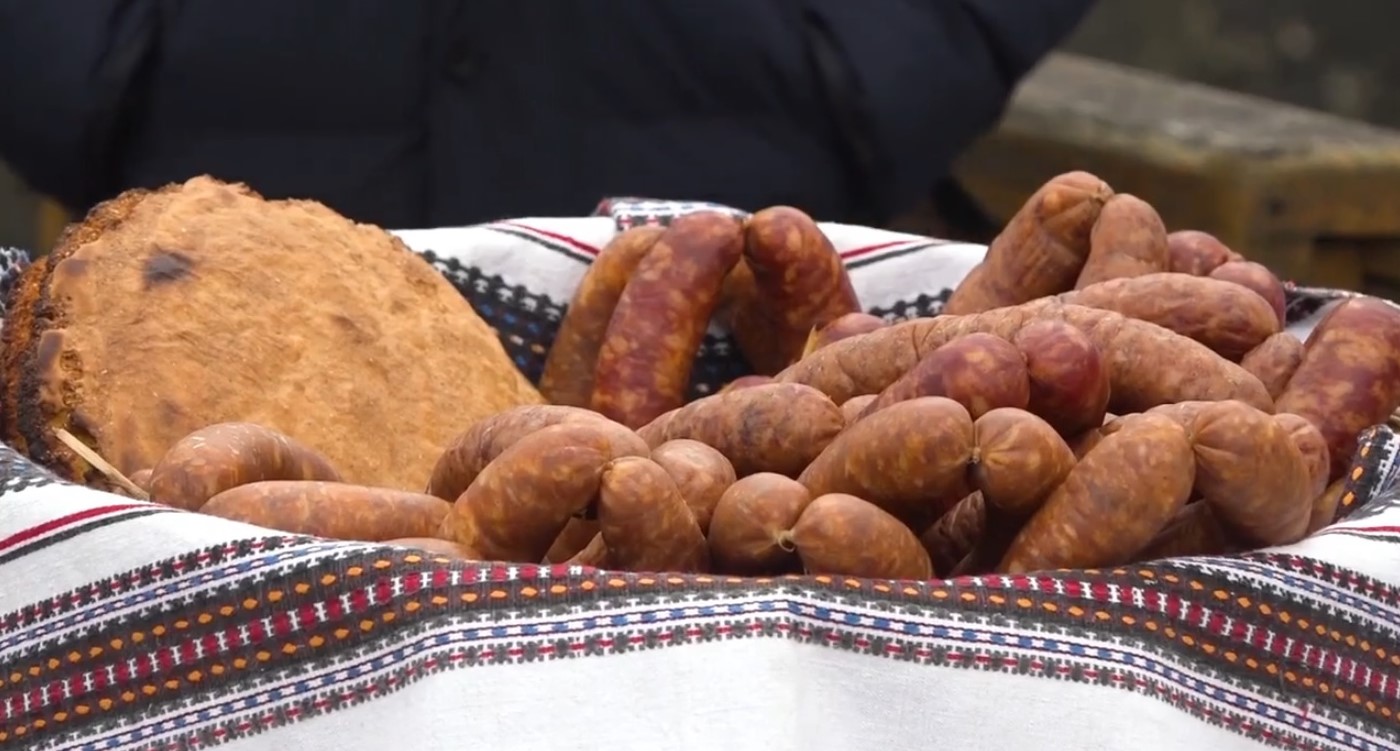
The members of the Ethno Fletno Association are working on protecting Samobor cornbread, usually eaten with Samoborska cesnjofka, but also other home-made dishes. / Screenshot Televizija Zapad
A few years ago, the City of Samobor even launched the Češnofka Festival, but due to the coronavirus pandemic, it was not held last year. This year, it will be held if the epidemiological situation allows it. And not only that. On the occasion of protecting samoborska češnofka, the Deputy Mayor of Samobor, Željko Stanec, announced a center for various Samobor tradition guardians.
Samobor gastronomic delicacies available in the "to go" offer
The diligent hands of the people of this region write the history of taste worth experiencing. Although the restaurants are still closed, all the flavors of the Samobor region are available in the "to go" offer in the "K Gabreku 1929 "cellar, the favorite Kavana Livadić, and "U prolazu" confectionery for the well-known kremšnite in Samobor.
Therefore, you can spend this 'almost' spring weekend in Samobor, 30 minutes away from Zagreb's capital, with protected indigenous flavors. This charming town along the Slovenian border dates back to 1242 and the charter by which King Bela IV confirmed the status of a free royal trading post.
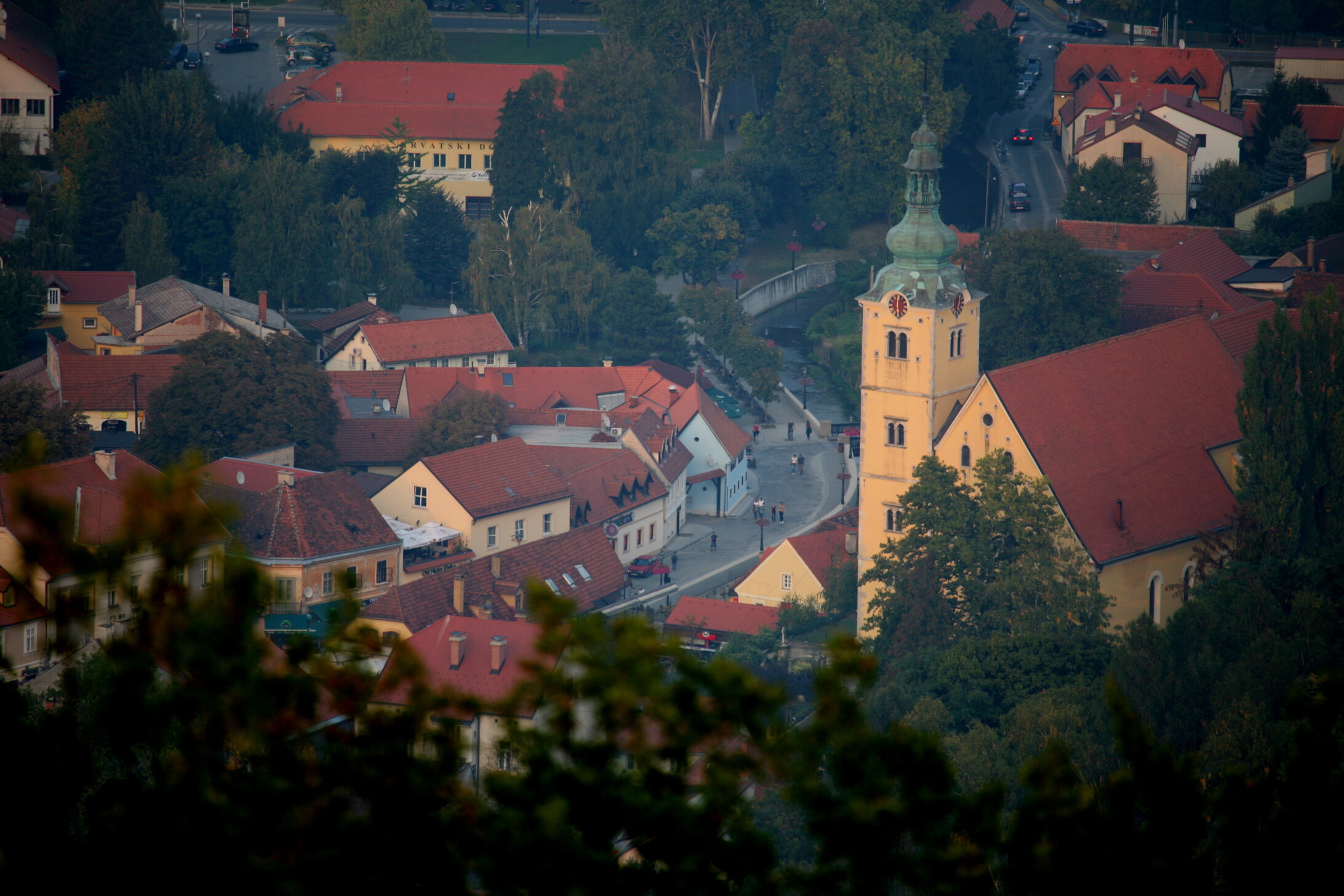
Samobor / Zagreb County Tourist Board
Also, Samobor Square is one of the few where all buildings are protected monuments of the first category. Right next to the main square, in the Filipec family tasting room, you can taste another Samobor gastronomic icon – bremet, the most famous liqueur in the Zagreb region. Samobor bermet is an aromatized red wine made from selected varieties of Portuguese and Frankovka grapes with wormwood and southern fruit. The secret recipe dates back to the time before Napoleon.
Zagreb people's favorite excursion destination
This urban pearl of Zagreb County, with its preserved old town, but also with numerous cultural sights, has always attracted excursionists and tourists.
A walk through Samobor comes across the Samobor Museum, the former dock of the composer Ferdo Livadić and a gathering place for cultural greats of that time. The Old Samobor Town ruins, a former castle that watches over the town in the lowlands, hide its turbulent history.
From 1268 until recently, this building was owned by many different families. It used to flourish with life, and now there is only one beautiful monument left to the destructive ravages of time. Over the centuries, numerous nobles and kings were the lords of Samobor-grad, from the Czech king Otokar, who built it in 1268, to Arpadović, Frankopan, Erdody, Matija Korvin, and many other blue blood families.
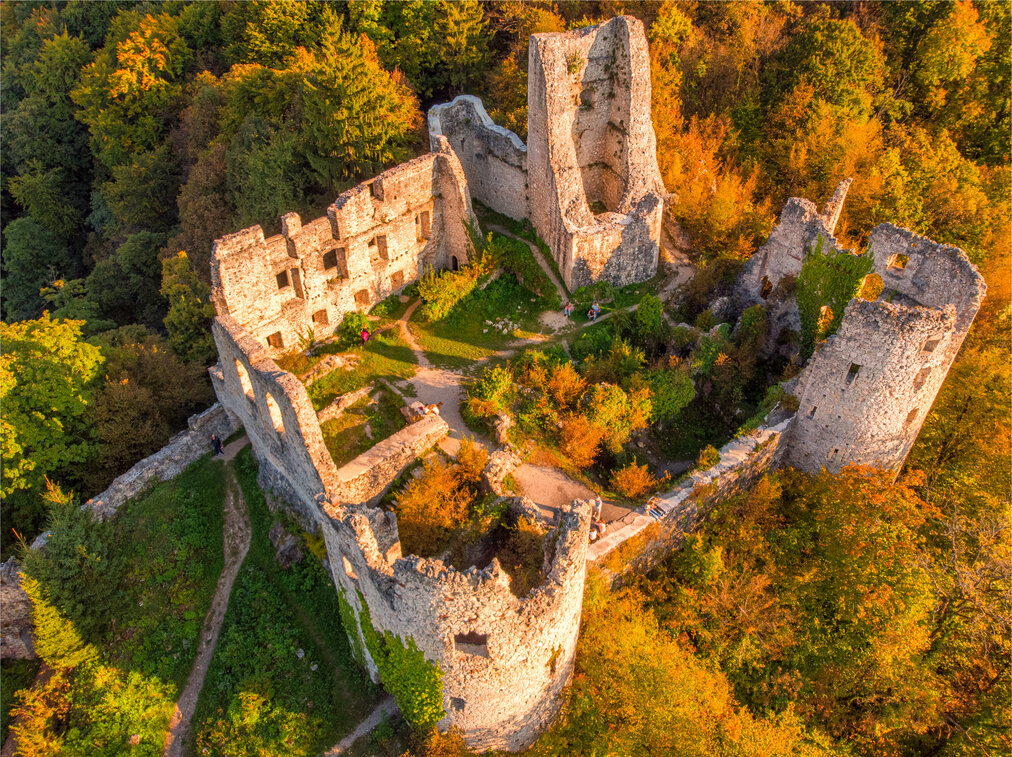
Ruins of Samobor Old Town / R. Klarić, Zagreb County Tourist Board
As the owners changed, so did this castle. In 1902, the Old Town ended up in Samobor's ownership for 5,293 crowns. Since then, attempts have been made to rebuild it, but no attempt has borne fruit. But maybe even better, because the castle in this form has some magic that it might not have if it wasn't in this state. There is a spirit of the time in it. It hides among the walls and swims among the surrounding trees. This place truly breathes some unique energy. The fort is located in a forest not far from the center of Samobor.
Oh, and did you know that Samobor's Old Town was almost fatal for Jackie Chan, who nearly perished here while shooting the famous film God's Armor?
Oldest mine, nature park, mountain peaks, and educational trails
Only five kilometers away from Samobor, in the Rude village, you can visit the Mine of St. Barbara, one of Europe's oldest copper and iron mines. This small settlement gave rise to the mentioned first protected gastronomic product of the Zagreb County – a crispy salt pie Rudarska greblica, once a modest snack of local miners.

Rudarska greblica / Josip Škof, Zagreb County Tourist Board
Outside Samobor, with a walk in the fresh air, unforgettable views uphill of the Samobor Hills, a protected Nature Park together with Žumberak, await to be discovered. There are many marked trails, and they will satisfy both beginner walkers and ambitious climbers. Although none of them is higher than 1000 meters, the peaks Oštrc, Japetić, and Okić are key places in Croatian mountaineering.
The first trip under the Croatian Mountaineering Association's auspices was organized in 1875 to Oštrc, and the ascent of the writer Dragojla Jarnević on the steep side of Okić in 1843 was Croatian's first recorded alpine venture.
You can add an educational note to the trip by visiting the Budinjak Eco Center and the Educational Trail of Princes, a prehistoric site with a site of old burial mounds, or the Ethno House under Okić. In this rural household, time stood still more than a century ago.
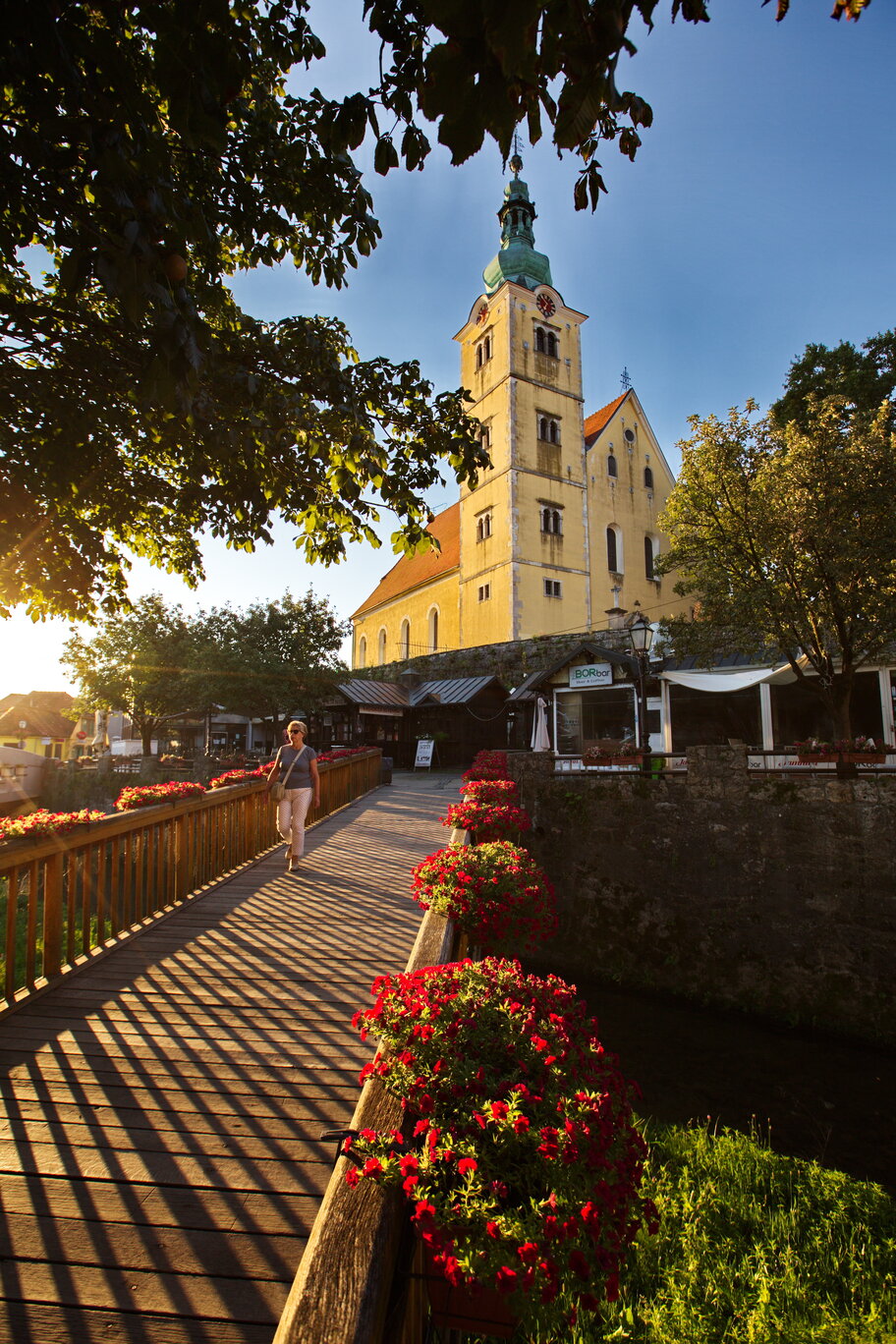
Welcome to Samobor / Josip Škof, Zagreb County Tourist Board
Source: Zagreb County Tourist Board
To read more news from Croatia, follow TCN's dedicated page.
HRK 8 Million for Nine Towns and Municipalities in Gorski Kotar
ZAGREB, 19 February, 2021 - Regional Development and EU Funds Minister Nataša Tramišak on Friday presented representatives of nine municipalities and towns in Gorski Kotar with contracts worth over HRK 8 million, based on which each local unit will receive nearly a million kuna of non-repayable funds.
The cities of Čabar, Delnice and Vrbovsko and the municipalities of Mrkopalj, Fužine, Skrad, Brod Moravice, Ravna Gora and Lokve received funds for projects such as the construction and extension of a kindergarten, a recreation centre, the reconstruction of unclassified roads and public lighting.
Minister Tramišak said that HRK 8 million had been provided from the state budget for projects that ensure better living conditions.
"For the first time this year 30% of the funding from the programme for the sustainable development of mountainous regions is earmarked especially for the Gorski Kotar area," she said, announcing a programme for the development of mountainous regions for this year, which will define new measures and activities for businesspeople and entrepreneurs, that is, for investments in those areas, especially Gorski Kotar.
That will, in addition to the European funding in the new programming period, certainly help the development of the economy, entrepreneurship and thus demographic revitalisation, she said.
"The government has by this year invested over HRK 36 million in Gorski Kotar, and there is a total of HRK 190 million worth of European projects, especially for water infrastructure", Minister Tramišak said.
Maritime Affairs, Transport and Infrastructure Minister Oleg Butković said that the fact that cities and municipalities had submitted their applications indicated that they knew how to prepare and manage projects and that the ministry and the government were willing to continue assisting them.
Answering reporters' questions, he recalled that four years ago assistance had been provided for the maintenance of local roads in Gorski Kotar, that is, for the winter service through the Hrvatske Ceste road company, which was still being done.
"This government has done a lot to financially stabilise all local units," Butković said, noting that it is good that in addition to big, strategic infrastructure projects, there are also smaller projects, important to local units.
"The duty of all of us in the government is to help smaller local units, especially in Gorski Kotar, Lika... Dalmatinska Zagora, Slavonia, particularly quake-hit areas, to realise and finance their projects," Minister Butković said.
(€1 = HRK 7.56)
First Laboratory for Rapid Molecular Diagnostics in Croatia Opens in Rijeka
ZAGREB, 19 February, 2021 - The first laboratory for rapid molecular diagnostics in emergency medicine in Croatia was presented on Friday at the KBC Rijeka hospital's emergency service.
That laboratory was developed in cooperation with the Centre for Proteomics of the University of Rijeka and the KBC Rijeka hospital. It will enable, among other benefits, a significant reduction in the time needed to diagnose coronavirus to only three to six hours.
Director of KBC Rijeka Alen Ružić said that at the start of the second wave of the COVID-19 pandemic, the hospital had no diagnostic devices of its own.
The first PCR laboratory in that hospital started working soon, and thanks to new scientific knowledge, this laboratory for rapid molecular diagnostics in now being opened, Ružić said.
It is important that it is located at the emergency department, which reduces the costs of transport and protective equipment and increases the level of safety for patients and hospital staff from coronavirus spreading, he said.
State Secretary at the Ministry of Health Željko Plazonić said that launching the laboratory was a great contribution to and progress in treatment, as well as proof that the new management of KBC Rijeka was quickly adapting and reorganising amid the pandemic.
He stressed that the Health Ministry had provided HRK 125,000 for this laboratory, which is worth HRK 440,000. He recalled that the ministry had also invested HRK 537,000 in equipping the first PCR laboratory in Rijeka's KBC.
Plazonić announced the possibility of establishing a faculty of pharmacy in Rijeka.
Magnitude 2.9 Earthquake Rocks Senj Area
ZAGREB, 19 February, 2021 - A magnitude 2.9 earthquake was registered near Senj at 2.43 p.m. on Friday, Croatia's Seismological Survey said.
The epicentre was northeast of the coastal town.
SDP: Government Helping Multinational Companies, Shifting Burden of Crisis Onto Citizens
ZAGREB, 19 February, 2021 - SDP vice-presidents Siniša Hajdaš Dončić and Biljana Borzan on Friday announced an initiative in the European Parliament that would force multinational companies to pay taxes where they operate, stressing that the Croatian government does not want to support the initiative.
That way, the government is shifting the burden of the crisis onto citizens, they said.
According to the latest figures, 10% of the EU's total GDP is stolen, hidden or unfairly distributed, and the populist movements that call for tax cuts have at their core the wish to enable the rich in the business sector to pay less and less taxes while the entire cost of social spending is shifted onto the middle class, small and micro businesses and EU citizens, Hajdaš Dončić said at a news conference.
"The SDP considers this an unacceptable way of sharing the national wealth and the only solution is progressive taxation. The main question is how to facilitate fair tax distribution and force the richest to pay their share and participate in the crisis caused by the pandemic," he said.
He noted that tax or fiscal policies were national policies but that without coordination and a joint approach, EU countries would not be able to respond to the key problems of the last decade, including the question of why everyone was not contributing in line with their economic power.
There is also the question of why the biggest multinational corporations use tax breaks and tax havens and why some member states unfairly, through lower taxes, attract the wealthiest to start business in them.
When the amount of evaded taxes is compared, it accounts for 3 to 4% of Croatia's GDP for companies that run some business operations in Croatia. The proposal is to make a black list of those companies and to exclude them from any EU programmes, he said.
"I really do not understand why the HDZ-led government of Prime Minister Andrej Plenković is opposed to that," he said.
Difference between left and right
SDP vice-president and MEP Biljana Borzan said that an EP study showed that the EU loses 30-50 billion euros annually to tax evasion by multinational companies.
A Eurobarometer report shows 86% of EU citizens want stricter control of tax evasion and tax havens and 71% of Croatian citizens believe the problem should be solved at EU level.
A draft directive to be discussed by the European Council next Thursday is aimed at obliging big multinational companies with turnovers of more than €750 million to report for each member state how much money they make there, the value of their assets, the number of employees and the amount of taxes paid.
The directive also regulates fines that are proportional and deterring.
The health crisis brings with itself a major economic crisis, and some countries' governments can decide to shift the burden of the crisis onto citizens or they can force those who earn big profits in Europe to pay taxes, Borzan said.
She noted that the directive had been stuck at the Council for four years even though it had passed all the necessary procedures. She explained that a majority could not be achieved as some member states did not want to support the directive as they themselves are tax havens and some protected their own multinational companies.
Croatia has found itself among them even though it has no such companies, with the government explaining that a decision must be unanimous because it concerns tax policy even though the EC has explained that the directive concerns business reporting, which requires a qualified majority, Borzan said.
She noted that by the start of Croatia's EU presidency a turnaround happened and majority support was created to launch changes, "but Croatia did not put the issue on the agenda of the Council even though it could have and as EU chair should have," Borzan said, adding that at the time she sent a letter to then economy minister Darko Horvat to put the issue on agenda, but nothing happened.
"We often hear questions about the difference between the left-wing and right-wing parties today. Here is the difference - while the SDP is looking for ways to relieve the burden on citizens, the HDZ has, for reasons unclear to us, been siding with multinational companies which evade the payment of huge amounts of taxes," she said, noting that according to information available to her, the chances of the directive being passed were very big and that it would be interesting to see which position the Croatian government would take.
Olympic Qualifiers: Croatia Water Polo Defeats Georgia in Quarterfinal (6:15)
February 19, 2021 - Croatia water polo defeats Georgia in the quarterfinal match of the Olympic qualifying tournament in Rotterdam on Friday evening. They will meet Montenegro in the semifinal match tomorrow!
Behind Croatia are five rounds made up of four victories and one defeat at the Olympic Qualifying tournament in Rotterdam thus far. Recall, Croatia won their first match against Romania at 16:6, defeated the Netherlands 25:8, topped France 10:13, lost to Russia 13:14, and beat Germany 22:8 in the final group stage match.
Croatia thus finished the group stage with eight points, four wins, and a defeat against Russia, which finished first with nine points.
To qualify for the Olympics, Croatia needed to achieve two more victories in Rotterdam, the first against Georgia in the quarterfinals, and then on Saturday in the semifinals or on Sunday in a possible duel for third place.
Georgia v Croatia Recap
Maro Jokovic scored Croatia's first goal and the first of the game for 0:1 with 5:26 to go in the first quarter. Garcia made it 2:2 for Croatia nearly four minutes later - and Luka Loncar scored to end the first quarter 2:3 for Croatia.
Luka Bukic scored 20 seconds into the second quarter for 2:4, and two goals by Ante Vukicevic increased Croatia's lead to 6:2 with 5:24 to go in the quarter. Loren Fatovic made it 2:7 with 4:45 left, and Maro Jokovic scored a rocket from outside for 3:8. Loncar scored for 3:9 with a minute to go, which was the score going into the half.
Josip Vrlic scored Croatia's first goal of the third quarter nearly six minutes in! Croatia was up +6. Luka Bukic made it 4:11, which is how the third quarter ended.
Luka Bukic opened the final quarter with a goal for 4:12. Fatovic scored a penalty for 4:13 and again for 5:14. Bukic scored for 6:15, which was the final score of the match.
The four winning teams will play in the semifinals on February 20. The finalists of the qualifying tournament, as well as the national team that wins the match for third place on February 21, will qualify for the Olympic Games in Tokyo, which are scheduled from July 24 to August 8, 2021.
To read more about sport in Croatia, follow TCN's dedicated page.
Quarter of Smokers in Croatia Smoke More Because of Pandemic and Earthquakes
ZAGREB, 19 February, 2021 - One in four smokers in Croatia smokes more than before as a result of the coronavirus pandemic and last year's devastating earthquakes, a survey conducted by Ja Trgovac magazine and the Hendal market research agency shows.
The survey of tobacco consumption habits in Croatia was carried out in January on a nationally representative sample of citizens aged 18 and over.
A quarter of smokers interviewed, namely 26%, said they smoked more, while 18.5% said they smoked less. On the other hand, 56% said that the coronavirus outbreak did not affect their smoking habits.
Most of smokers (41.5%) spend up to HRK 200 (€26.5) a month on tobacco products and 32.8% up to HRK 500 (€66.5)). 22% spend up to HRK 1,000 (€133) and 3.7% more than HRK 1,000.
33.9% of respondents said they used tobacco products (cigarettes, electronic cigarettes, new generation products such as IQOS and glo, cigars or rolling tobacco), while 66.1% said they did not use tobacco products.
The survey revealed that cigarettes were the most popular tobacco product, used by 76% of consumers, ahead of rolling tobacco (22.9%), new generation products (13.2%), e-cigarettes (12.2%), cigars (1.4%) and chewing tobacco (0.4%). 1.4% of tobacco product consumers said they used something else.
70.4% of smokers buy tobacco products at newsagents', 46.1% do so at petrol stations, 42.5% at supermarkets, 36.4% in local shops and 16% in specialised tobacco shops. On the other hand, 9.1% buy tobacco products on the black market.
Croatian Agriculture Has Shown Resilience, Says Minister
ZAGREB, 19 February, 2021 - Agriculture Minister Marija Vučković was visiting Vukovar-Srijem County on Friday, where she presented contracts on the co-financing of projects from the Rural Development Programme and said that Croatian agriculture has shown resilience.
Citing Croatian Bureau of Statistics estimates, she said in Vukovar that agricultural production grew by 7% or HRK 1.4 billion in 2020, the highest increase since 2008, while gross added value and factor and entrepreneurial incomes increased between 14 and 16%.
Those figures show that Croatian agriculture is not on a bad path, that domestic producers are resilient and creative, and that the Rural Development Programme is showing results, the minister said.
"We have to insist on economic programmes for farmland, on connecting everyone in the food production chain and on boosting the processing industry, which will then best stimulate primary agricultural production," Vučković said.
Without increasing productivity and competitiveness, Slavonia cannot become stronger, she said.
Speaking of a farmland bill, the minister said the government wished to debate it with everyone concerned. As our most valuable resource, farmland is worth much more than all the incentives we will receive from the EU, she added.
Responding to questions from the press, Vučković said the government and her ministry had done their best to boost the sugar industry in Croatia.
Headquarters Suspect 10 More Cases of New Coronavirus Variant, Maybe Even Croatian Variant
February 19, 2021 – The National Civil Protection Headquarters said they suspect ten more cases of a new coronavirus variant and that we may even have a Croatian variant. Regarding the epidemiological measures, Davor Božinović pointed out there is still no relaxation.
Today, the National Civil Protection Headquarters held a press conference on the coronavirus situation in Croatia. In the last 24 hours, 388 new SARS-CoV-2 virus infection cases were recorded, and the number of active cases in Croatia today is 2313. Among them, 798 patients are in hospital, of which 73 are on a respirator. Eight people died.
Since February 25, 2020, when the first case of infection was recorded in Croatia, 239,254 people infected with the new coronavirus have been recorded, of which 5,407 have died. A total of 231,534 people have recovered, of which 358 in the last 24 hours.
There are currently 11,725 people in self-isolation. To date, 1,293,415 people have been tested, of which 4,986 in the last 24 hours.
Croatia has the third-lowest incidence in Europe
At the press conference, the latest data on vaccination in Croatia were presented – 93,012 people were vaccinated, and 56,963 people received two doses of the vaccine, meaning that the vaccination was completed for them.
Krunoslav Capak stated that today's number of new cases is 388, a week ago there were 371 new cases, and two weeks ago 549 new cases.
"This is the first time in more than a month that the daily figure is slightly higher than a week ago. The current incidence is 111.4. The highest is in Split-Dalmatia and the lowest in Istria. In the EU, Croatia is in third place. Only Finland and Denmark have a lower incidence than Croatia. The Czech Republic currently has the highest," Capak said.
New quantities of all three vaccines to arrive next week
There were 832 reports of suspected vaccine side effects: 781 on Pfizer, 33 on Moderna, and 18 on AstraZeneca.
Next week, we will get 23,400 Pfizer vaccines. Moderna will send 16,000 doses on February 25. We will get 52,658 doses from AstraZeneca. By the end of March, it will be just over 700,000 doses.
"It is difficult to predict the end of the second phase, but this group includes about one million and 200-300 thousand people, but we do not know how many want to be vaccinated. The vaccination platform will start soon, from which we will draw data, and we will know how many people want to be vaccinated in the second phase, so we will be able to say how much time we will need," Capak said.
Health Minister Vili Beroš referred to the possibility of importing Russian vaccines. He says it all depends on the dynamics of vaccine arrival. However, if the European Medicines Agency does not approve the Russian vaccine, HALMED (Agency for Medicinal Products and Medical Devices) may intervene to introduce such a vaccine. They are considering the possibility and have approached the Russian authorities for additional documentation.
'We expect that the situation will be much better before the summer'
Capak commented on the vaccination outcome.
"It is very difficult to estimate when we will vaccinate most of the population. We also have people who have survived COVID-19. We do not know how long the immunity lasts in those people. We do not know how long the immunity from the vaccine will last. When our immune system rises, there will not be so many sensitive people that the virus can spread quickly. We expect that the situation will be much better before the summer. If you get vaccinated with AstraZeneca, you probably won't have to wear a mask," Capak said.
Journalists were interested if they are at risk and whether they should be vaccinated. Capak said journalists are not in the group of people at risk, but they are priority workers such as airport workers and the like.
"There are many such occupations that will be a priority, and when the time comes, we will make them public. We have a request from the Croatian Journalists' Association to consider the risk and to put journalists among the priorities when the second vaccination phase is completed," said Capak.
About the British, Brazilian, and Croatian variant
Capak also spoke about the British coronavirus variant. So far, he says, we have 11 confirmed cases in Croatia.
"What is new is that the Croatian Institute of Public Health (HZJZ) introduced a screening test for new variants. Yesterday, we tested 17 samples, of which we have ten suspicions of a new variant, and we sent all samples for confirmation to the Infectious Diseases Clinic. We will have confirmation whether they are British variants or not," said Capak.
He also talked about the Brazilian variant of coronavirus.
"The person tested for the mutation does not prove that it is a Brazilian variant, but it is one of the possible mutations and may belong to some other species. I would not call it the Brazilian variant. Maybe it will be called the Croatian variant because it has one mutation that other variants can have," Capak explained.
Still no easing of epidemiological measures
Davor Božinović commented on the possibility of COVID passports.
"This is a sensitive matter because, in Europe, it is considered that there should be no discrimination. And we will set ourselves up practically. We talked to the Ministry. On the one hand, it is still too early. Surely the talks will intensify to see how to do everything in our power to get tourism up and running to record a more successful tourist season than last. We achieved about 50 percent of the results from the record 2019, and by that, we are ahead of all our friends from Europe and beyond. You can be convinced that we are talking about it and that we will find the right path and, through bilateral contacts do everything to make our season as successful as possible," said Božinović.
Next week will be one year since the first case of coronavirus in Croatia. Alemka Markotić referred to the past year. She said that many patients are being monitored and that we will fight with the consequences of COVID-19 for many more years.
Božinović said that it is not yet possible to announce the easing of measures at the moment.
"For us, the decline in the infection cases lasts for more than two months, and we record a small but still growing growth today. I would not give an assessment at the moment. This may be due to cooling. We will see when it warms up how the numbers will move and what they will show in a week or two at the beginning of March," said Božinović.
They will continue to talk and make decisions.
To read morea bout coronavirus in Croatia, follow TCN's dedicated page.


